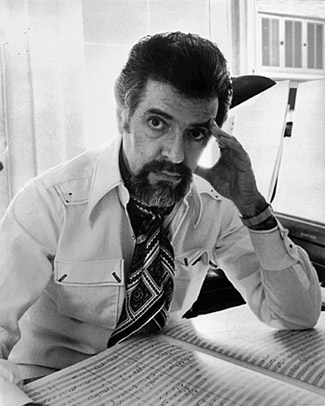

  |
|
|
||||||||||||||||||||||
|
FMS FEATURE... November 13, 2009 Wild Bunch composer Jerry Fielding Honored Jules Verne Festival celebrates the 40th anniversary of Peckinpah's masterpiece by Jon Burlingame  The theater was packed for the sold-out Nov. 12 event, which also included an award to the family of filmmaker Sam Peckinpah and personal appearances by several of his Wild Bunch actors including Ernest Borgnine, Bo Hopkins and L.Q. Jones. Other veterans of Peckinpah films including Ali MacGraw, Isela Vega and Donnie Fritts were on hand as well. Producer Nick Redman — whose Oscar-nominated The Wild Bunch: An Album in Montage was also screened, and whose soundtrack-album career includes several Fielding scores — served as host, along with Verne Festival founders Jean-Christophe Jeauffre and Frederic Dieudonne. Fielding died in February 1980 at the age of 57. Although nominated for three Academy Awards — for Peckinpah's The Wild Bunch (1969) and Straw Dogs (1971) and Clint Eastwood's The Outlaw Josey Wales (1976), he rarely received industry honors during his lifetime; even his Emmy (for High Midnight, 1979) was given posthumously. Redman called him "a singular artist, a man of grace and grit (who valued) intregity and loyalty." and whose "checkered career," as he put it, saw him surviving the Hollywood blacklist of the 1950s only to find himself working regularly with the volatile Peckinpah in the 1960s and '70s. (Their other films included Junior Bonner, Bring Me the Head of Alfredo Garcia, The Killer Elite, Noon Wine for television and an unused score for The Getaway.) Actors Vega and Fritts, both of whom knew Fielding personally, presented the composer's daughter, Claudia Fielding, with a lifetime achievement award. Fielding's widow Camille and other daughter Elizabeth were also in attendance. During a pre-event reception, Vega reminisced about Fielding's tireless search for musical authenticity. "In Mexico City, when we were shooting Alfredo Garcia," she said, "he would go out on the streets and listen. He would listen to what they were playing and what people sung. He would capture the sounds of the place. He would observe. He was a great musician." Fritts, who did three films with Peckinpah, called Fielding "a brilliant composer. He was such a gentleman, as opposed to Sam," he added with a laugh. "I was around Sam for years, and the worst was the day Kris Kristofferson and I were doing the looping for Alfredo Garcia. Jerry handled the whole day with dignity and grace." Claudia Fielding said she thought much of her father's success was because "he was a thinking musician. He brought intellect to the work, which is very rare. He always said to me that if you noticed the music in a movie it was definitely wrong. In many of my father's films, the music enhances the movie but doesn't stand out on its own." Asked why she thought Fielding and Peckinpah stayed partners for so long, she suggested that it was because "opposites attract. They were such great comrades. I think my father had the opportunity to reel him in when it was necessary, and ground him. Sam always knew that my father would do that. "But," he added, "I remember vicious, vicious fights between them as well. I'll never forget how many times he quit, and how often my father said, over dinner to my mother, how hard Sam pushed him, the deadlines he was up against, how he'd say he was not doing any more rewrites. "I remember when my father died, the way that Sam came back to our house, the telegrams and the roses that we got. And the way he looked at my mother when he came through that door. To a moral certainty I know he felt responsible for (my dad's) last heart attack. And I remember how small Sam looked — he was larger than life, but everything about him was different that day." Legendary jazz musician Buddy Collette became visibly emotional when asked to reminisce about Fielding. Fielding hired him in 1950 to play flute, clarinet and saxophone as part of the house band on TV's popular quiz show You Bet Your Life, hosted by Groucho Marx. At the time, L.A. still had segregated musicians' unions (Local 47 for whites, 767 for blacks) and yet Fielding took a stand by hiring Collette, who was black. "He was one of our best writers, and a very courageous guy," Collette said. "It was the first time a black musician played on a network TV show. The other guys in the band would say, 'he had to go through a lot to have you here,' and I knew that." Melissa Peckinpah, the director's daughter, accepted the Jules Verne Legendaire Award on behalf of the Peckinpah family. Also attending was Peckinpah's sister Fern Lea Peter. Borgnine, 92, who received a standing ovation from the crowd, said he was "very humbled... just a part of this great picture." Citing fellow actors William Holden, Robert Ryan, Edmond O'Brien, Warren Oates and Ben Johnson, he said "I wish with all my heart that they were here tonight to see the fruits of their labor." ©2009 Jon Burlingame |
Search
Past Features
Feature Archives
|